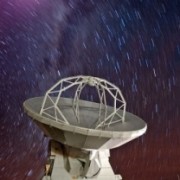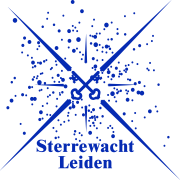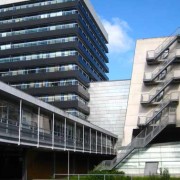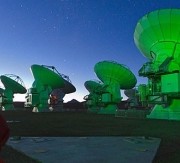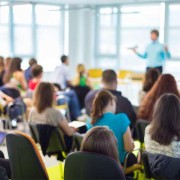Postdoctoral Support Position at the ALMA ARC node at Leiden Observatory
/in Allegro/by AllegroAllegro, the Netherlands node of the European ALMA Regional Centre (ARC) at Leiden Observatory, invites applications for a postdoctoral support position. As part of the European ARC network, Allegro supports ALMA users and ALMA operations and development.
The position offers the opportunity for research at one of the major centres of astronomy in the Netherlands as well as an in-depth involvement in the development and operations of ALMA. Leiden astronomers carry out observational and theoretical research in the fields of cosmology, formation and evolution of galaxies, galactic structure, molecular astrophysics, star- and planet formation, as well as computational and laboratory astrophysics and instrumentation. In particular, we are interested in candidates that use ALMA or ALMA data as a prominent part of their research. A minimum of 30% of time will be available for personal research. Besides self-defined research, the appointee is expected to spend time on the technical and user support of ALMA and we are looking for an enthusiastic and motivated applicant to work within the Allegro team on a variety of topics. Allegro’s expertise areas include high-frequency submm observations, research into improved imaging and calibration techniques for ALMA data, especially related to atmospheric effects and phase metrics, mmVLBI, and advanced science tools such as radiative transfer codes and a spectral line database. The appointment will be for two years initially, renewable up to a maximum of four years based on need, funding, and performance. The position comes with a competitive salary and full benefits of an employee in the public sector.
Qualifications and selection criteria: PhD in Astronomy, Physics, or related field, or proven track record of relevant experience. Research experience in fields directly related to submm astronomy. Experience with radio interferometric data is highly desirable. The applicant must have a good working knowledge of Linux. Familiarity with astronomical data reduction, in particular CASA, is a strong desirable. An ability to work as part of an international team is essential. The position may involve extended research trips of several weeks. The Leiden ARC node values diversity in its workforce.
Please submit applications electronically at http://jobs.strw.leidenuniv.nl/2016/tilanusPD. The search will continue until the position is filled; applications arriving before the deadline of June 15, 2016 will be assured of full consideration. You will be asked to fill in a web form, to provide contact information for two referees, and to upload a cover letter, curriculum vitae, a brief statement of research experience and interests and a publication list.
Postdoc salaries range from € 3044 to € 3996 gross per month (pay scale 10, in accordance with the Collective Labour Agreement for Dutch Universities). Leiden University offers an attractive benefits package that includes additional vacation (8%) and end-of-year (8.3%) bonuses, sick leave, maternity and parental leaves, and retirement benefits. Candidates from outside the Netherlands may be eligible for a substantial tax break. Leiden Observatory is the oldest university astronomy department in the world and the largest astronomy department in the Netherlands. Leiden is a charming university town with international flair close to Amsterdam.
Email Address for Inquiries: rtilanus@strw.leidenuniv.nl
ALMA Phase Correction Workshop
/in Allegro, Workshops/by AllegroAllegro, Leiden, May 30 – June 3, 2016
A workshop focused on how to improve the ALMA phase corrections is jointly organized by the ALMA observatory and Allegro. It will be held at Leiden Observatory from May 30 – Jun 3. Participation is by invitation only. Find more details below:
ALMA imaging observations – particularly on long baselines – are often limited more by phase fluctuations than atmospheric transmission or PWV. To enable more long-baseline or high-frequency observations, or improve existing data, we need to look at ways to improve the phase correction.
The aims of this workshop are:
- Review the methods that could improve ALMA phase correction and image fidelity. Including (but not limited to) baseline accuracy, WVR corrections, pressure and other environmental fluctuations, cycle times, online/offline WVR correction.
- Summarise the results from the related test observations during the 2014 and 2015 long-baseline campaigns, and identify and quantify the methods that do produce noticeable improvements.
- Make recommendations for changes in ALMA software, hardware and/or observing methods which will improve phase correction
A pdf detailed version of the program can be found in this link: Phasemeeting_final_agenda
| Mon 30/05 | (Afternoon Session) | Room HL 204 |
|---|---|---|
| 13:30-13:45 | Welcome & Logistics | Remo |
| 13:45-14:15 | Outline of the meeting & Topic Organisation | Ed – Bill |
| Single Source Statistics | ||
| 14:30-15:00 | ALMA Long Baseline Campaign 2014/2015 – Basic Phase Characteristics & Pseudo cycling | Satoki |
| 15:00-15:20 | COFFEE BREAK | |
| 15:20-15:50 | ALMA Long Baseline Campaign 2014 – Weather Correlations & Use of the Two-Point-Deviation | Luke |
| 16:00-16:30 | Examination of the GonoGo criterion – Results from 2014/2015 – | Bill |
| 16:40-18:00 | Open Discussion Time | |
| Tue 31/05 | (Morning Session) | Room HL 204 |
|---|---|---|
| WVR Discussions | ||
| 09:00-09:45 | Introduction to Radiometer-based Phase Correction – Principles, Instrumentation and Application | Richard |
| 10:00-10:20 | The O2 Oxygen sounder – Applicability in better atmosphere models | George |
| 10:20-10:30 | COFFEE BREAK | |
| 10:30-10:50 | WVR application timescale, 1 sec vs. 6 sec | Ed |
| 11:00-11:30 | Optimising WVR solutions (scaling) – improved phases and images | Luke |
| 11:40-12:00 | Cloud Continuum removal – Effectiveness, applicability | Bill |
| 12:10-12:30 | TelCal WVR online, monitoring and phase RMS calculations | Dominique |
| 12:40-13:00 | Correlation of changes with measured pressure over the array | Satoki |
| Tue 31/05 | (Afternoon Session) | Room HL 204 |
|---|---|---|
| 14:00-15:00 | Open Discussion Time | |
| 15:00-15:20 | COFFEE BREAK | |
| Antenna Position Measurements | ||
| 15:20-15:40 | ‘Inside’ Tc Antpos – phase correction, analysis, SPW combination and plots | Dominique |
| 15:50-16:20 | Long baseline antenna measurements | Todd |
| 16:20-16:40 | COFFEE BREAK | |
| 16:40-17:10 | Are antenna position changes related to tropospheric changes? | Ed |
| 17:20-17:40 | Suggested observing strategies for the next long baselines to reduce the effect of ‘changes’ | Ed |
| 17:40-18:30 | Open Discussion Time | |
| Wed 01/06 | (Morning Session) | Room HL 106 |
|---|---|---|
| Phase referencing statistics | ||
| 09:00-09:20 | Is the GonoGo criteria good for estimating the phase referencing scheme | Bill |
| 09:30-10:00 | Phase referencing statistics and correlations – Fast switching experiments 2014/2015. Details of source separation, cycle time and image quality. When does and doesn’t fast switching work | Yoshi |
| 10:10-10:20 | What about the calibrators? Searches and contributions | Anita |
| 10:30-10:40 | Multi frequency AGN survey with the KVN | Taehyun |
| 10:40-10:50 | COFFEE BREAK | |
| 10:50-11:10 | Pushing bands 9 and 10 beyond 5 km configurations – ‘normal’ observing techniques | Ed |
| 11:20-11:40 | Testing phase referencing in marginal conditions – does very-fast referencing really help | Yoshi – Ed |
| 11:50-12:10 | Diurnal properties of the long baseline phase statistics | Bill – Ed |
| 12:00-13:00 | Open Discussion Time | |
| Wed 01/06 | (Afternoon Session) | Room HL 106 |
|---|---|---|
| Astrometry | ||
| 14:00-14:20 | Astrometry results from the long baseline campaign – multi source observations for accurate astrometry | Antonio |
| 14:30-15:00 | Is this single test sufficient, further examination, astrometry runs, multi calibrators in science data | Ed – Antonio – Open discussion |
| 15:00-15:20 | Long term astrometry: Parallax studies, proper motions, planet/stellar wobbles – tests, feasibility, offered observation modes for LB? | Ed |
| 15:20-15:30 | COFFEE BREAK | |
| 15:30-15:50 | Check sources for Astrometry | Ed |
| 16:00-17:00 | Open Discussion Time | |
| Group Meal Evening — Belgisch Bier Cafe Olivier – 7 pm (Directions) | ||
| Thu 02/06 | (Morning Session) | Room HL 106 |
|---|---|---|
| ALMA Long Baseline experience | ||
| 10:00-10:20 | Lessons Learned at LB (1) | Crystal (LINK) |
| 10:30-10:50 | Lessons Learned at LB (2) | Anita |
| 11:00-10:20 | The use of Check sources during the observations – What the QA2 current script does with check sources and plans for improvements | Todd (LINK) |
| 11:20-11:40 | COFFEE BREAK | |
| 11:40-12:40 | Open Discussion Time | |
| Thu 02/06 | (Afternoon Session) | Room HL 106 |
|---|---|---|
| Higher Frequencies | ||
| 14:00-14:20 | ALMA Band-to-Band (B2B) tests attempts | Ed |
| 14:30-14:50 | Band 3 to Band 7 fast switching results | Yoshi |
| 15:00-15:20 | Dual frequency simulation using sub-arrays – Band 3 to 6 tests | Luke |
| 15:20-15:40 | COFFEE BREAK | |
| 15:40-16:00 | ALMA High Frequency calibrator cone searches | Yanett – Carmen |
| 16:10-17:30 | Open Discussion Time | |
| Fri 03/06 | (Morning Session) | Room HL 106 |
|---|---|---|
| Summary and Future | ||
| 09:30-10:00 | Conference Summary | Remo |
| 10:15-… | Open Session | |
Please, find the workshop presentations and summary in the password protected area (password notified by email, no username required):
Link to online presentations and presentations review.
The workshop is jointly organized by the ALMA observatory and Allegro, the Netherlands ARC node. It will be held at Leiden Observatory from May 30 – Jun 3. Participation is by invitation only.
Hotel occupancy in Leiden is expected to be high for this period and you are urged to book early. A block reservation has been arranged at the IBIS hotel, opposite Leiden Centraal railway station: Link to Ibis hotel
This booking is held until 18/04/2016. After this date rooms that have not been reserved will be canceled. Workshop attendees receive a discounted price. Reservations need to be made via email to H8087-RE@accor.com mentioning the booking code STER280516:
o Single room incl. breakfast: €81.50 (€ 79 room plus € 2.50 tax per person/per day)
o Double room incl. breakfast: €97.00 (€92 room plus €2.50 tax per person/per day)
For those of you staying at the IBIS hotel situated adjacent from Leiden Centraal Station there will be taxis arranged to take you to the university and back each day. There will be enough space for ~15 people in total.
| Leave Ibis | Leave University | Monday | 13:00 | 18:00 | Tuesday | 08:30 | 18:30 | Wednesday | 08:30 | 17:30 | Thursday | 09:30 | 17:30 | Friday | 09:00 | 12:30 |
|---|
As an alternative there are regular buses from the station, buses 43 (direction Den Haag) or bus 57 (direction Nieuw Vennep). These take around 7 minutes. Please see the link below for more specific details if you will be coming by bus.
Instructions on how to get to Leiden Observatory, including transportation from Schiphol Airport, can be found here:
https://www.lorentzcenter.nl/howto.php
And a site map can be found here:
https://www.lorentzcenter.nl/map_LC_hotels_stat_web.php
Note these specify the route to the Lorentz Center, which is in the forward leaning building in the photo. Leiden Observatory and Allegro are located on the 4th and 5th floor of that same building. Note that this is not the old Observatory in the center of Leiden. The workshop will be held on the First and Second floors of the joining building – The Huygens Building (HL) – in either rooms 204 or 106 (see directions below).
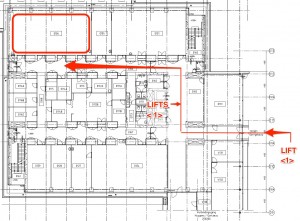
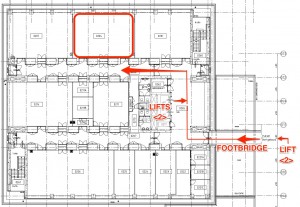

WEBEX link for remote participation (only Mac and Windows OS):
This is be open every day of the meeting, you simply click and follow the instructions below (see also Webex_Getting_Started ).
Instructions:
– Use a Windows or Mac OsX computer (NOT Linux) and point the browser to the provided link.
Firefox works, but there are sporadic reports of Safari not working. To be safe, also quit
Skype before you start since under some conditions it can latch on the mic/speaker.
– After signing in (your name and an email address) click the large button on the left “Connect to Audio” –> “Call Using this Computer –>
(select correct audio devices –> be sure to hit “OK” (audio won’t work in meeting until you hit the “OK”). (See page 1 & 3 of the attached guide).
– If possible, use earphones with a microphone.
– Note there are tabs (upper left) for different pages, so check those first if you can not find your way.
– On the right there are buttons to open “Participants”, “Chat” etc. panels. If you make your window large enough it
is possible to have both panels open at the same time. Chat will work even when audio/video is not working
(assuming the person on the other end keeps an eye on it).
– The gear box above the video panel allows you to set the video source (it default for a mac to the camera
on the notebook display which may be closed and you’ll have to then set it to the camera on the external display.)
– The “audio” button below the participants list opens the audio selection/test panel.
The evening meal will be on Wed 7 pm at the Belgisch Bier Cafe Olivier – Hooigracht 23, 2312 KM Leiden.
Find directions from Leiden Centraal station to the restaurant here:
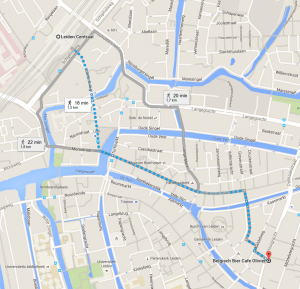
And the menu here: Menu_Olivier_Eng
| Name |
|---|
| Anita Richards |
| Richard Hills |
| Satoki Matsushita |
| Yoshiharu Asaki |
| Bill Dent |
| Ed Fomalont |
| Ray Blundell |
| Juan R. Pardo |
| George Bendo |
| Scott Paine |
| Dominique Broguiere |
| Taehyun Jung |
| Neil Phillips |
| Michael Bremer |
| Bojan Nikolic |
| Antonio Hales |
| Allegro |
Requested remote participation (see instructions here):
| Name |
|---|
| Crystal Bogan |
| Todd Hunter |
| Liz Humphreys |
| Alan Roy |
Expert advice from Allegro for ALMA Cycle 4 proposals
/in Allegro/by AllegroThe Call for Proposals for ALMA Cycle 4 will come out on March 22, 2016. Deadline for proposal submission is April 21, 2016. Full details on the call and the expected capabilities can be found here.
New capabilities expected in Cycle 4 include
– ACA stand-alone observations
– Large Programs (>50 hrs)
– mm-wave VLBI
– Solar observations
A full list of expected modes is available via the link above. Some modes are non-standard and restricted to 20% of the observing time.
We would like to remind you that Allegro offers expert advice on proposal feasibility, preparation, and optimization, via e-mail, phone, skype or face-to-face visit. We are available to answer any question you have about your planned ALMA proposal and assist you with developing the technical case of your proposal.
Unlike earlier years, we are not planning any special events where we present the capabilities of the upcoming ALMA Cycle: this information is just as easily read on the ALMA Science Portal. Instead, we invite you to contact us wit specific questions about your proposal or about the ALMA capabilities. We are more than happy to help!
You can contact Allegro at alma@strw.leidenuniv.nl. Face-to-face support can also be requested via the ALMA Helpdesk. You are of course also very welcome to contact any of the Allegro staff directly.
ALMA Cycle 3 workshops Mar-Apr 2015
/in Allegro, Workshops/by AllegroThe workshops to prepare for ALMA cycle 3 proposals will be divided between NOVA interest groups as follows:
Network 1 (Galaxies, cosmology): Groningen, April 1
Network 2 (Galaxy, star and planet formation): Amsterdam, March 10
Network 3 (Compact objects, black holes, neutron stars): Nijmegen, tbd
ALMA Cycle workshop and NL Submillimeter Day 20-21 June 2012
/in Allegro, Workshops/by AllegroJoint ALMA Cycle 1 workshop and NL Submillimeter Day
Tuesday, 24 April 2012 15:58
We are happy to announce a two-day workshop on ALMA Cycle 1 scientific capabilities held jointly with a NL Submillimeter Day. The meeting will take place on Wednesday June 20 and Thursday June 21 at Leiden Observatory.
On the first day we will introduce the scientific capabilities for ALMA Cycle 1, which will run from January 1 2013 until November 2013, with a proposal deadline in mid July 2012. In the afternoon we will discuss (other) submillimeter developments in the Netherlands, and discuss future prospects.
On the second day, we will demonstrate the ALMA proposal preparation software, with an emphasis on the new capabilities compared to Cycle 0. This will be followed by a hands-on training using this software. The use of software to simulate ALMA observations of scientific targets will also be demonstrated.
CASA Cycle 0 PI Workshop 12-14 Dec 2011
/in Allegro, Workshops/by AllegroAllegro organised a CASA Workshop from Monday, 12 Dec to Wednesday, 14 Dec 2011, which was dedicated to the PIs and co-Is of successful ALMA Cycle 0 proposals.
ALMA Early Science Cycle 0 Workshop
/in Allegro, Workshops/by AllegroThis workshop provided an overview of the Early Science call and a hands-on tutorial on the Observing Tool (OT) and CASA as well as help with proposal preparation for Cycle 0. See also this page for more information on the call for Early Science.
Workshop material
Participants are asked to bring their own laptop for the hands-on sessions and to have the OT and CASA installed beforehand.Both OT and CASA can be downloaded for https://almascience.eso.org. Go to “Documents & Tools” –> “Tools” where you will find links to both OT and CASA.
In the hands-on session we will be working on a BIMA data set in CASA. The data set can be downloaded here (66MB).
For the ALMA simulator we will use a Spitzer image as a “sky model”. Download the FITS file here.
Logistics
See this page for detailed travel directions to Leiden observatory. The workshop will be held in rooms 207 (Wednesday 20) and 214 (Thursday 21) on the second floor of the Huygens building.
Coffee and Tea will be provided during the coffee breaks. Lunch is not included.
Final program
Wednesday, April 20
09:30 – 09:40 Welcome & logistics
09:40 – 10:40 Introduction to ALMA and Early Science (Martin Zwaan, ESO)
10:40 – 11:00 Coffee
11:00 – 12:00 Introduction to writing ALMA proposals + discussion (Michiel Hogerheijde, Allegro)
12:00 – 13:00 Lunch
13:00 – 13:40 Science tools (Floris van der Tak, SRON)
13:40 – 14:00 LIME and ARTIST (Christian Brinch, Allegro)
14:00 – 14:45 OT tutorial (Agnes Kospal, Allegro)
14:45 – 17:00 OT hands-on w/coffee
Thursday, April 21
09:00 – 10:00 Talks by participants (see below)
10:00 – 10:45 User support by Allegro during the early science phase + discussion (Michiel Hogerheijde, Allegro)
10:45 – 11:15 Coffee
11:15 – 12:15 The ALMA simulator (Eelco van Kampen, ESO)
12:15 – 13:15 Lunch
13:15 – 14:00 Introduction to CASA (Christian Brinch, Allegro)
14:00 – 16:00 How to simulate ALMA data, hands-on session (Various codes, from simple RADEX to complex radiative transfer and the CASA ‘simdata’ tool)
Talk by participants: Pamela Klaassen (Ionized and Molecular Gas Dynamics in Massive Star Forming Regions), Attila Juhasz (Testing planet formation theories with CO observations of transitional disks), Nienke van der Marel (Transitional disks), Edo Loenen (Spectral line imaging of nearby galaxies), Gergö Popping (Gas predictions of high redshift galaxies). 10 minutes each.

